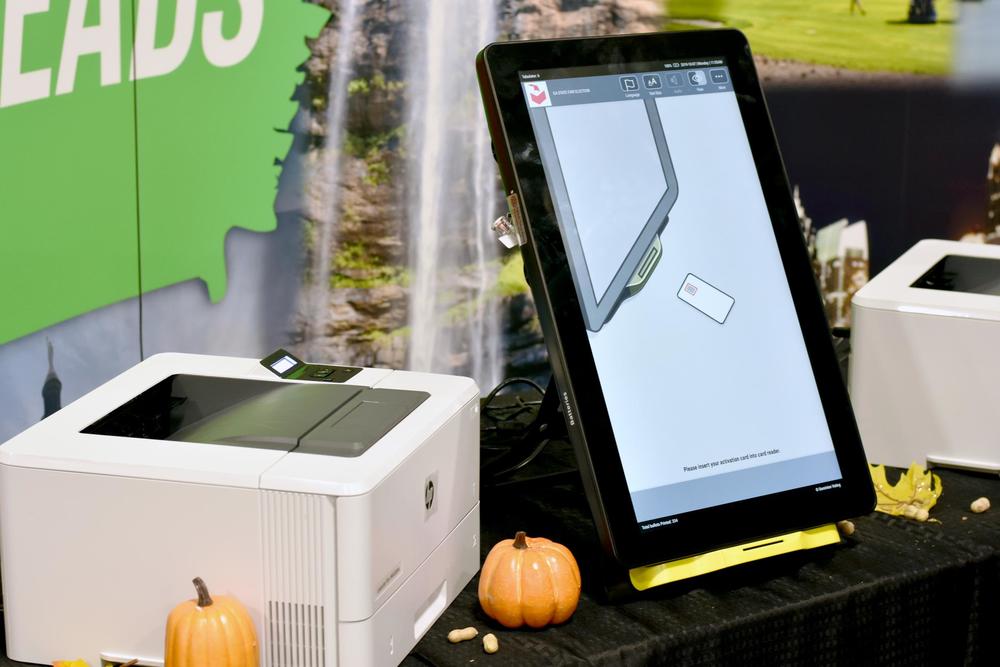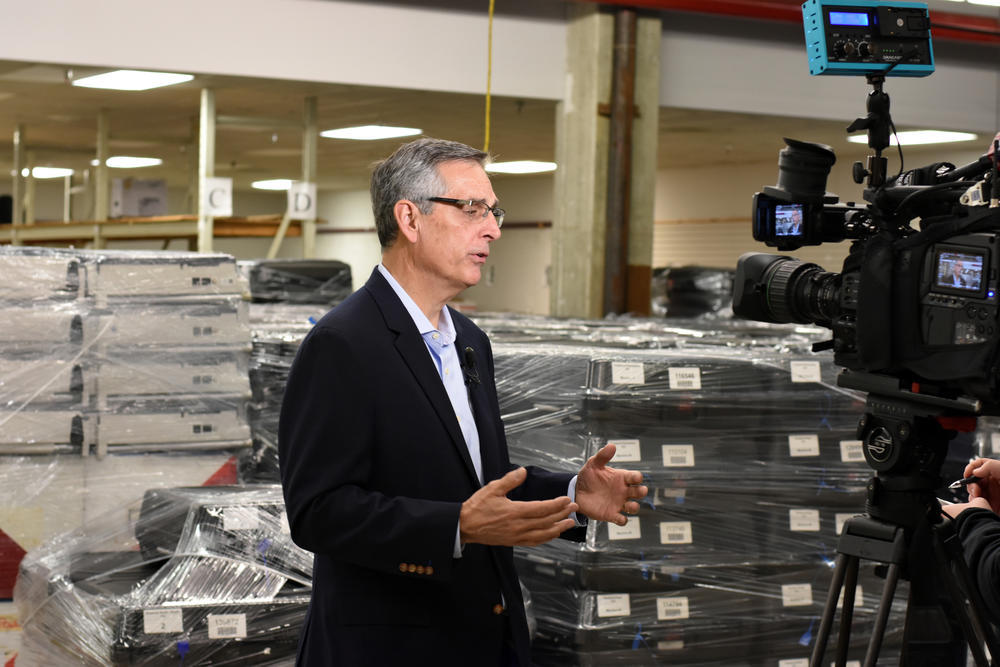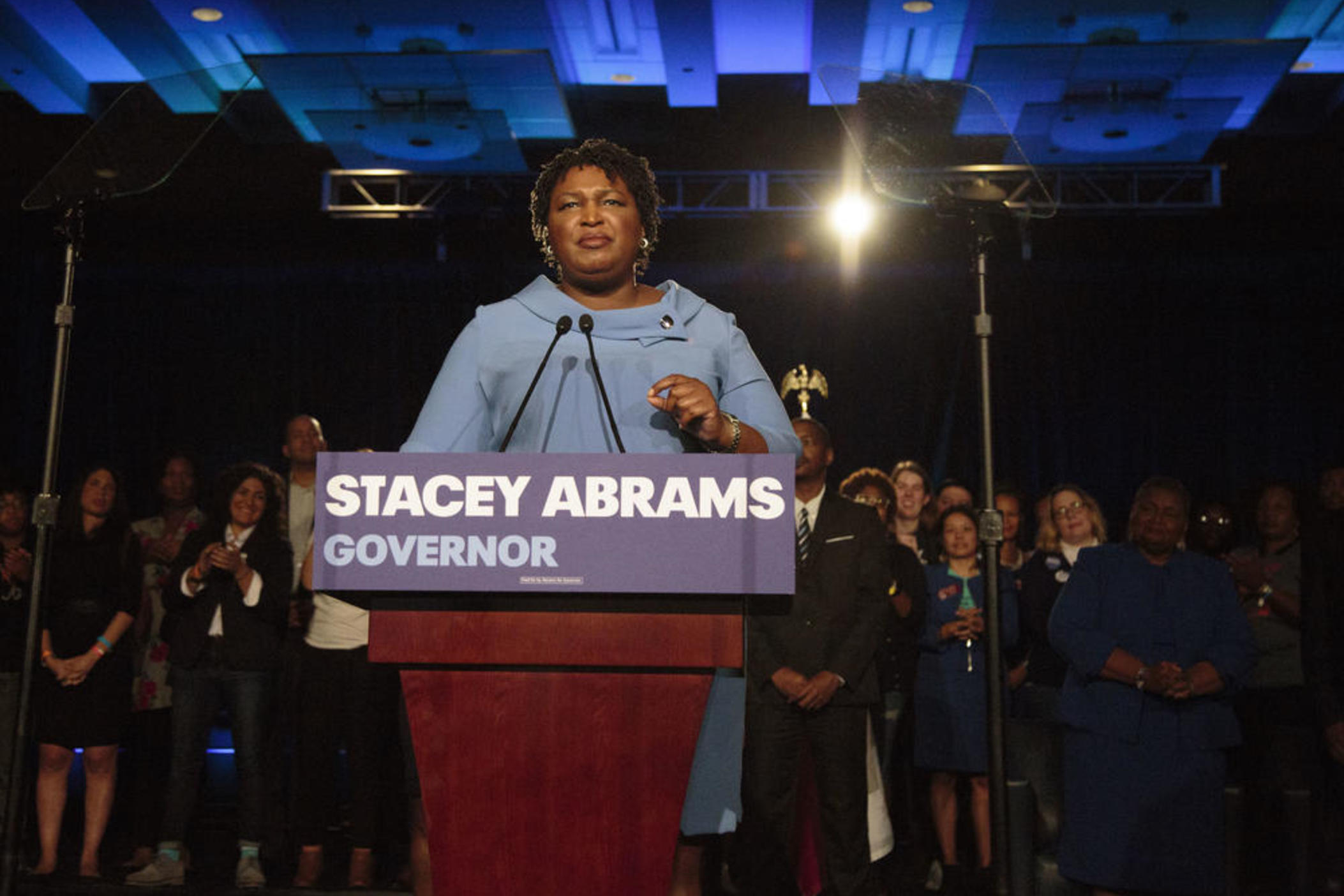
Section Branding
Header Content
Battleground: Ballot Box | A Year That Changed Voting In Georgia
Primary Content
In this episode, we explore how Georgia’s voting landscape changed drastically after the 2018 governor’s race, from lawsuits to the selection of a new voting system.
On November 16, 2018, ten days after Georgia’s gubernatorial election, Democrat Stacey Abrams took to the stage in front of her supporters and gave an unconventional concession speech.
“I acknowledge that former Secretary of State Brian Kemp will be certified as the victor in the 2018 gubernatorial election,” she said. “But to watch an elected official — who claims to represent the people of this state, baldly pin his hopes for election on the suppression of the people’s democratic right to vote — has been truly appalling. So, to be clear, this is not a speech of concession.”
That race roiled with fierce debate over who gets to vote and how they do it.
On one hand, Kemp was the state’s top elections official, a position he did not resign until after Election Day and it seemed he would emerge victorious. During the campaign, the Republican Secretary of State was embroiled in several controversies, including allegations of voter suppression, the removal of hundreds of thousands of inactive voters from the rolls through aggressive list maintenance and, the weekend before the 2018 election, came an especially explosive allegation.
Kemp said the Democratic Party of Georgia tried and failed to hack the state’s voter registration system — a claim that ultimately was found not to be true by investigators — and that those responsible would be held accountable.
On the other side of the aisle, Stacey Abrams made voting rights a central part of her platform, launching an unprecedented get-out-the vote effort that included registering nonwhite voters, a huge push for absentee-by-mail voting, and actively challenging policies that she said made it harder for some Georgians to cast their ballot.
After the election, she launched a new voting rights group, Fair Fight, that has taken the rallying cry of equal access to the polls nationwide.
Meanwhile, there were other changes brewing.
Earlier in 2018, Kemp established the Secure, Accessible, Fair Elections Commission, a group of lawmakers, county elections officials and other experts that met several times to discuss options to replace Georgia’s aging touchscreen electronic voting machines that stored votes on memory cards with something more modern and more secure.
At one hearing in Macon, public commenters wanted the state to change to hand-marked paper ballots, where voters fill in an oval by hand, just like absentee ballots.
Former Secretary of State Cathy Cox, a Democrat, gave a presentation to the group about the last time Georgia changed voting systems in the early 2000s, from a hodgepodge of paper ballots, lever machines, and locally-decided methods to a uniform direct-recording electronic voting machine.
If you add paper into the mix, she warned, having everything marked by humans could lead to confusion and some headaches if people did not fully fill in the ovals.
“This commission doesn’t need to throw out the baby with the bathwater and solve one problem, i.e. security of a piece of technology, and go back to issues that create a lot of problems for voters,” she said.
Still, the lone cybersecurity expert in the group, Georgia Tech Computer Science Professor Dr. Wenke Lee, recommended hand-marked paper ballots as the most secure option. He said that they ensure that voters can check their choices and trust the outcome of the election.
“And also I also want to object to this notion that I’m possibly the single person who is having this opinion,” he said at the final SAFE Commission meeting. “I mean, you have heard from all these citizens, through public hearings and email and so on.”
But the commission ultimately recommended Georgia move to a ballot-marking device system that prints out a paper ballot with the voter’s choices, brand new scanners and new electronic poll books used to check voters in.
Around the same time as those final recommendations were hashed out, five different voting machine vendors hawked their wares in a train depot event space in the shadow of the state Capitol.
Incoming secretary of state Brad Raffensperger was there, as well as several lawmakers and members of the public who wanted to get their hands on the potential future of Georgia’s elections.
The state was widely expected to pick a system made by Election Systems and Software, which was the state’s current vendor. For their proposal, voters would insert a piece of paper into a touchscreen machine, make their selections and then print choices on that paper before putting it into a scanner.
There were other demonstrations from Hart InterCivic, Smartmatic and, in particular, Dominion.
One vendor, Clear Ballot, used hand-marked paper ballots and a complicated software system to scan ballots and shows every single mark made on one screen. That way officials could determine what was meant to be a vote and what was a stray mark.
At this demonstration, too, advocates for hand-marked paper ballots showed up to try and convince lawmakers that the ballot-marking devices would be a boondoggle for taxpayers, arguing that millions of dollars would be wasted on technology and the security risk would remain just as great, if not greater.
“Almost all of these vendors have the right options available, but they’ve been told this state is interested in machines that cost about five times more than what the state needs,” Marilyn Marks with the nonprofit voting rights group Coalition for Good Governance said. “All of them have the capability to read hand-marked paper ballots.”
While lawmakers and elections officials were working through the process of picking a new voting machine, Marks and a group of Georgia voters were waging a battle in court over electronic voting — since 2017, and still ongoing, in fact.
But back under the Gold Dome, debate over the bill that would authorize a new voting system, HB 316, was one of the most contentious topics of 2019.
Secretary Raffensperger dismissed hand-marked paper ballot activists as people "outside of the mainstream," citing a poll conducted by a firm — with ties to his campaign for office — that found three in four Georgians were supportive of new touchscreen voting machines.
“You have to understand that a lot of people that support the touchscreen technology, they don't show up at these meetings,” he said. “They're out there and they're just working their jobs, they're trying to provide for their families and they feel really comfortable about it. And so they're not up in arms, and they think we're going to get it right in the General Assembly. And, by and large, the General Assembly usually gets it right.”
In the General Assembly, debate raged over the omnibus HB 316 that authorized $150 million for a new voting system that would make Georgia the only state in the country to only use ballot-marking devices for in-person voting. The bill also enacted numerous changes to election laws after court fights stemming from the 2018 election.
For hours and hours in the House and Senate, Democrats and Republicans sparred over language in the bill and how to move Georgia’s elections into the 21st century.
They heard testimony from county elections officials who said the new devices were similar enough to Georgia’s old system that they would limit confusion and new enough to provide more security and reliability for voters.
And still, there was testimony and public comment that hand-marked paper ballots were cheaper, more secure and a better path for Georgia.
The Republican-controlled House and Senate quickly moved on and passed the bill on to Gov. Brian Kemp, who signed it into law with little fanfare.
Additionally, HB 316 required audits of election results, starting with the 2020 presidential election. It also extended the time frame in which voters could be inactive before having their registrations canceled and it curbed Georgia’s rigid “exact-match” policy, which flagged and held up voter registrations that were not identical to state or federal databases.
So then the next big questions emerged: What vendor was it going to be, how much would it cost and when would everyone start using it? At the end of July 2019, we had our answer.
Georgia awarded the contract to Dominion Voting Systems, the cost would be over $100 million and the statewide rollout would be done in time for the March 24, 2020 presidential preference primary.
Dominion Voting Systems did not score the highest on technical evaluations but was the lowest cost proposal, and, perhaps importantly, they said they could do the largest single rollout of a voting system in just a few months with little issue.
That was a lofty goal in the best of circumstances, but the court case brought by hand-marked paper ballot activists threatened to make the whole thing moot.
Enter federal Judge Amy Totenberg, who said that Georgia officials “buried their heads in the sand” and allowed Georgia’s election system to “grow way too old and archaic.”
She had just heard two days of testimony about why Georgia’s new voting system wouldn’t be any better, and how state and county officials said it would be too disruptive to interrupt the ongoing procurement process.
The judge had previously denied a request to switch to hand-marked paper ballots just before the 2018 election, writing that the “massive scrambling… will seriously test the organizational capacity of the personnel handling the election, to the detriment of Georgia voters.”
But she also said there was a tide of evidence that Georgia’s system was not secure or reliable.
So, on August 15, Totenberg denied a request to move the 2019 elections to hand-marked paper ballots once again, with a notable exception: Georgia could no longer use its outdated direct-recording electronic machines after the end of the year.
The ruling put mounting pressure on the state to pilot the new system in November and get 159 counties' worth of people trained before the March 2020 presidential primary — not to mention acclimating voters.

Later that fall at the Georgia National Fair in Perry, thousands of people took breaks from turkey legs and carnival rides to try out these new voting machines, helped by high school student ambassadors like 15-year-old Camila Negron from Savannah.
“I'm helping people understand how easy voting is,” she said after high-fiving a woman who cast her mock ballot. “And I feel like I'm contributing to our future in a way, because I'm allowing people to see how easy it is and make them realize, ‘Oh I can just vote in like two minutes.’”
In November, the pilot elections in local contests across the state had some issues — poll workers not using the check-in iPads correctly, a scanner jamming and not enough power outlets for the voting equipment.
Then there was controversy over Georgia’s voter roll cleanup — required by federal law but still grabbing headlines.
More than 300,000 registrations were set to be canceled. Some voters had died, others moved away, but the biggest eyebrow-raisers were inactive voters who had not participated in years.
One lawsuit and several rounds of math later, about 286,000 registrations were ultimately removed.
By the end of 2019, the secretary of state’s office kicked into overdrive to deliver the equipment needed to run the new voting system to 159 counties.

Standing in a DeKalb County warehouse in December, Secretary of State Raffesnperger said the four largest counties would all be getting their machines after the holiday season — about a third of all voting equipment in the state.
In the year following a highly contentious governor’s race, the conversation around voting in Georgia shifted rapidly. As 2019 drew to a close, state elections officials were threading the needle of lawsuits and deadlines to be ready for a consequential election year with every state and federal lawmaker on the ballot.
In the next episode, we’ll unpack the whirlwind year that 2020 has become, from the final equipment delivery to the coronavirus pandemic to the catastrophic primary that happened in June.
Battleground: Ballot Box is a production of Georgia Public Broadcasting. You can subscribe to our show gpb.org/battleground or anywhere you get podcasts.
Please leave us a rating and review on Apple Podcasts. Our editor is Wayne Drash, our intern is Eva Rothenberg, our show is mixed by Jesse Nighswonger and the director of podcasting is Sean Powers.
Secondary Content
Bottom Content



